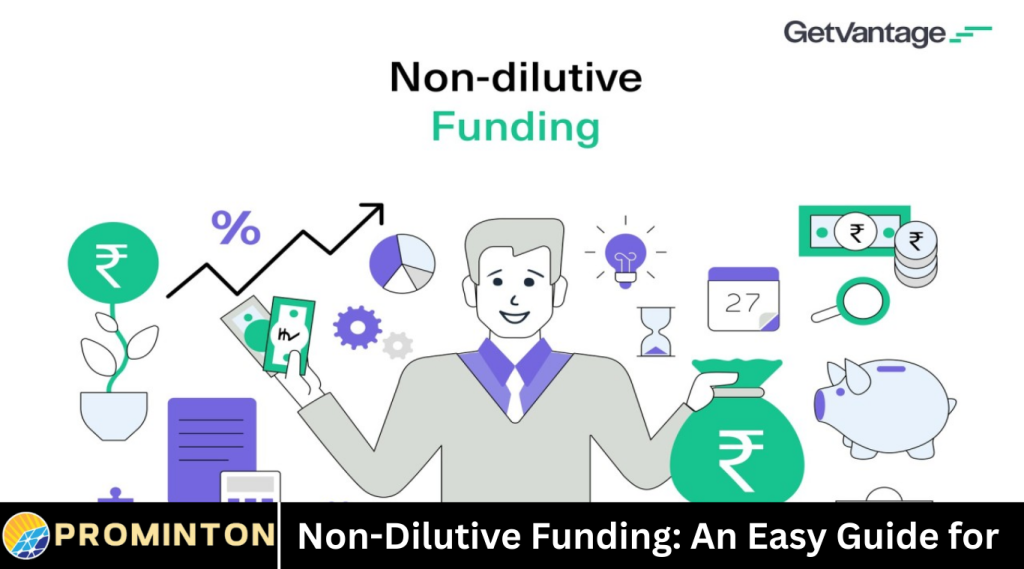Starting a new business can be exciting but also challenging, especially when it comes to funding. Most startups need money to develop their product, hire employees, and grow their company. Traditionally, many startups seek investments from venture capitalists or angel investors. However, these investments usually require giving up a part of the company, called equity. This means the founders lose some control and ownership.
Non-dilutive funding offers a different approach. It provides startups with money to grow without giving up equity or control. This kind of funding can be very helpful, especially in the early stages of a startup. In this article, we will explain what non-dilutive funding is, the different types available, their advantages and disadvantages, and how startups can find and use this funding effectively.
What is Non-Dilutive Funding?
Non-dilutive funding means getting money for your startup without having to give away any shares or ownership of your company. Unlike traditional investments where investors receive equity, non-dilutive funding does not dilute the ownership percentage of the founders or existing shareholders.
This type of funding is often provided by governments, grants, competitions, or certain organizations. It helps startups develop products, research new technologies, or expand operations without losing control of their company.
Types of Non-Dilutive Funding
Grants
Grants are funds given by governments, non-profits, or other organizations that do not need to be repaid. Many countries have programs to support startups working in technology, healthcare, clean energy, or other important areas.
Grants usually require startups to meet specific criteria and submit detailed applications. Winning a grant can provide significant funding for research and development or other business activities.
Competitions and Awards
Some organizations and companies run startup competitions that offer prize money or resources as rewards. These competitions often focus on innovation or solving particular problems.
Winning a competition can provide funding, publicity, and mentorship, all without giving up equity.
Research and Development (R&D) Tax Credits
Certain governments offer tax credits or refunds for money spent on research and development. These credits reduce the amount of tax a company has to pay, effectively providing financial support.
R&D tax credits encourage startups to innovate and develop new products by reducing their costs.
Customer Prepayments and Crowdfunding
Sometimes, customers or communities support startups by prepaying for products or donating money through crowdfunding platforms. This funding comes from customers or fans and does not require giving away equity.
Crowdfunding also helps test market demand and build a customer base.
Strategic Partnerships
Startups may form partnerships with larger companies that provide funding or resources in exchange for future business agreements or access to products. These partnerships do not always require equity sharing.
They can provide both funding and valuable business connections.
Advantages of Non-Dilutive Funding
Maintain Full Ownership
Since non-dilutive funding does not require giving up shares, founders retain full ownership and control of their company. This is important for startups that want to keep decision-making power.
Less Pressure to Deliver Fast Returns
Without investors expecting quick profits, startups can focus on long-term growth and innovation without constant pressure to deliver financial returns.
Access to Resources and Networks
Some non-dilutive funding sources provide more than just money. Grants and partnerships often come with access to mentors, advisors, and industry networks that can help startups succeed.
Supports Innovation and Research
Many non-dilutive funding options encourage startups to invest in new technologies and ideas. This support can help startups develop unique products and enter new markets.
Disadvantages of Non-Dilutive Funding
Competitive and Time-Consuming
Applying for grants, competitions, and tax credits can be time-consuming and complex. The process is often competitive, and many startups may not receive funding.
Restrictions on Use of Funds
Some non-dilutive funding comes with strict rules on how the money can be used. For example, grants may only be used for research and development, not for marketing or salaries.
Limited Amounts of Funding
Non-dilutive funding may not always provide large amounts of money compared to equity investments. Startups may need to combine it with other funding sources.
Reporting and Compliance Requirements
Recipients of grants or tax credits often have to provide detailed reports and meet compliance requirements. This adds administrative work to the startup team.
How to Find Non-Dilutive Funding Opportunities
Research Government Programs
Start by exploring government websites and agencies that support startups. Many countries offer grant programs and tax incentives for innovation and business growth.
Join Startup Networks and Incubators
Startup networks, incubators, and accelerators often have information about funding opportunities and can guide startups through the application process.
Attend Industry Events and Competitions
Participate in events where funding competitions take place. These can offer both funding and exposure to investors and partners.
Consult with Experts
Financial advisors, business consultants, or mentors can help identify suitable non-dilutive funding options and prepare strong applications.
Tips for Applying for Non-Dilutive Funding
Understand the Requirements
Carefully read the eligibility criteria and funding guidelines before applying to ensure your startup qualifies.
Prepare Clear and Detailed Applications
Provide clear information about your business, plans, and how the funding will be used. Detailed budgets and project descriptions improve your chances.
Highlight Innovation and Impact
Emphasize how your startup’s product or service is innovative and how it will benefit society, the economy, or the environment.
Follow Deadlines and Instructions
Submit your application on time and follow all instructions to avoid disqualification.
Keep Good Records
Maintain records of how you use the funds and prepare to report back to the funding organization as required.
Combining Non-Dilutive Funding with Other Sources
While non-dilutive funding is valuable, it may not cover all startup needs. Many startups combine it with equity investments, loans, or revenue from sales. This combination helps balance maintaining control with having enough capital to grow.
Frequently Asked Questions
What does non-dilutive funding mean?
Non-dilutive funding means getting money for your startup without giving away ownership shares or equity. It allows founders to keep full control of their company.
What are common types of non-dilutive funding?
Common types include grants, competitions, research and development tax credits, customer prepayments, crowdfunding, and strategic partnerships.
How is non-dilutive funding different from venture capital?
Venture capital requires giving equity to investors, which dilutes ownership. Non-dilutive funding does not require giving away any shares or ownership.
Can non-dilutive funding cover all startup costs?
Often, non-dilutive funding alone may not cover all costs. Startups usually combine it with other funding sources like investments or loans.
What are the challenges of getting non-dilutive funding?
Applying can be competitive and time-consuming. There may be restrictions on how funds are used, and recipients often need to meet reporting requirements.
How can startups find non-dilutive funding opportunities?
Startups can research government programs, join startup networks, attend competitions, and seek advice from experts or mentors.
Is non-dilutive funding available worldwide?
Many countries offer non-dilutive funding programs, but availability and types vary depending on the region and government policies.
Conclusion
Non-dilutive funding offers startups a valuable way to secure money without giving up ownership or control. Grants, competitions, tax credits, customer prepayments, and partnerships are common forms of non-dilutive funding that support innovation and growth. While applying for this funding requires effort and patience, the benefits include maintaining full ownership, reducing financial pressure, and accessing valuable resources.



